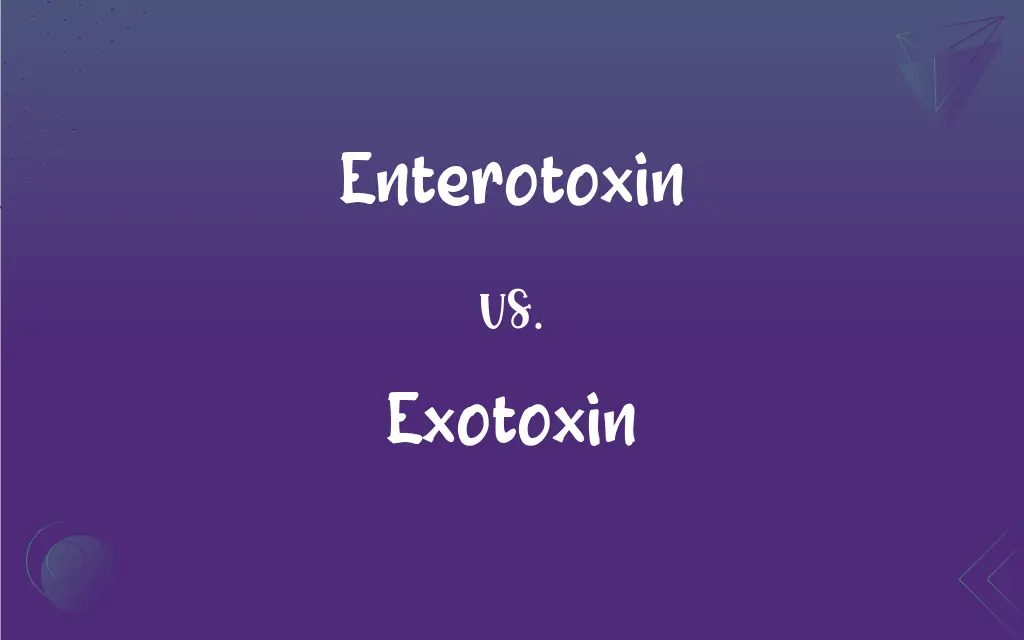Enterotoxin vs. Exotoxin: What's the Difference?
Edited by Aimie Carlson || By Janet White || Published on August 29, 2024
Enterotoxins target the intestines, while exotoxins are secreted by bacteria and affect various body parts.

Key Differences
Enterotoxins specifically target the gastrointestinal system, leading to symptoms like vomiting and diarrhea, whereas exotoxins, produced by certain bacteria, have a broader range of targets and can cause a variety of diseases, from tetanus to diphtheria.
Enterotoxins are a subset of exotoxins that focus on the intestines, causing disruptions in water and electrolyte balance, while exotoxins can affect cells at various sites, including the nervous system and skin.
The mechanism of enterotoxins involves the disruption of intestinal epithelial cell function, whereas exotoxins can act through different pathways, including enzyme inhibition and cell lysis.
Despite their differences, both enterotoxins and exotoxins play significant roles in bacterial pathogenicity, contributing to the severity of bacterial infections.
Understanding the distinction between enterotoxins and exotoxins is crucial for diagnosing and treating bacterial infections, as their effects on the human body and the immune response they trigger can vary widely.
ADVERTISEMENT
Comparison Chart
Definition
Toxins that specifically target the intestines
Toxins secreted by bacteria that can affect various body parts
Primary Effect
Disrupts the gut, causing symptoms like diarrhea
Can cause a range of symptoms, depending on the target tissue
Source
Typically produced by gastrointestinal pathogens
Produced by various types of bacteria
Disease Examples
Food poisoning, cholera
Tetanus, diphtheria, botulism
Mechanism of Action
Often disrupts intestinal cell function
May include enzyme inhibition, cell lysis, or other mechanisms
ADVERTISEMENT
Enterotoxin and Exotoxin Definitions
Enterotoxin
Enterotoxins can lead to symptoms like diarrhea and vomiting.
The enterotoxin in the spoiled seafood triggered immediate vomiting.
Exotoxin
Exotoxins can target a variety of cells and tissues.
The exotoxin's ability to target nerve cells led to neurological symptoms.
Enterotoxin
Enterotoxins are toxins that specifically target the intestines.
The enterotoxin produced by E. coli in contaminated food caused severe gastroenteritis.
Exotoxin
Exotoxins can cause a range of diseases, from skin infections to systemic illnesses.
The exotoxin produced by the bacterium was responsible for the skin lesions.
Enterotoxin
Enterotoxins are often associated with foodborne illnesses.
The restaurant outbreak was linked to an enterotoxin in undercooked shellfish.
Exotoxin
Exotoxins are potent, soluble toxins secreted by bacteria.
The exotoxin released by the bacteria caused a severe systemic infection.
Enterotoxin
Enterotoxins can result in fluid loss and dehydration.
Due to the enterotoxin's effects, the patient suffered from extreme dehydration.
Exotoxin
Exotoxins are heat-labile and can be inactivated by heating.
Boiling the contaminated food destroyed the exotoxin, making it safe to eat.
Enterotoxin
Enterotoxins disrupt the normal function of gastrointestinal cells.
The enterotoxin disrupted the absorption of nutrients, leading to malnutrition.
Exotoxin
Exotoxins often elicit a strong immune response.
The body's immune system launched a vigorous defense against the invading exotoxin.
Enterotoxin
A toxin produced by bacteria that is specific for intestinal cells and causes the vomiting and diarrhea associated with food poisoning.
Exotoxin
A poisonous substance secreted by a microorganism and released into the medium in which it grows.
Enterotoxin
(biochemistry) Any of several toxins produced by intestinal bacteria
Exotoxin
Any toxin secreted by a microorganism into the surrounding environment.
Enterotoxin
A cytotoxin specific for the cells of the intestinal mucosa
Exotoxin
A toxin that is secreted by microorganisms into the surrounding medium
FAQs
Are enterotoxins only produced by certain bacteria?
Yes, enterotoxins are typically produced by bacteria that infect the gastrointestinal tract.
What are exotoxins?
Exotoxins are a broad category of toxins secreted by bacteria, affecting various parts of the body.
How do enterotoxins cause symptoms?
Enterotoxins disrupt the normal function of intestinal cells, leading to symptoms like diarrhea and vomiting.
Can exotoxins affect the gut?
Yes, some exotoxins, including enterotoxins, can target the gut, but exotoxins can also affect other tissues.
How can exotoxins be inactivated?
Exotoxins, being heat-labile, can often be inactivated by heating.
Do enterotoxins cause food poisoning?
Yes, enterotoxins can cause food poisoning if ingested with contaminated food.
Can exotoxins cause systemic infections?
Yes, some exotoxins can enter the bloodstream and cause systemic infections.
Are enterotoxins a type of exotoxin?
Yes, enterotoxins are a specific type of exotoxin that targets the gastrointestinal system.
What are enterotoxins?
Enterotoxins are toxins that specifically affect the intestines, often leading to gastrointestinal symptoms.
Can enterotoxins be found in water?
Yes, enterotoxins can contaminate water, leading to outbreaks of diseases like cholera.
Are all exotoxins equally potent?
No, the potency of exotoxins can vary widely depending on the toxin and the bacterium producing it.
Can exotoxins be used in medicine?
In some cases, modified exotoxins are used in medical treatments, such as in immunotoxins for cancer therapy.
Can exotoxins cause neurological symptoms?
Yes, certain exotoxins, such as botulinum toxin, can affect the nervous system and cause neurological symptoms.
How are exotoxins classified?
Exotoxins are classified based on their mechanism of action and the tissues they target.
How are enterotoxins detected?
Enterotoxins can be detected using various laboratory tests, including ELISA and PCR.
What is the treatment for enterotoxin poisoning?
Treatment often includes rehydration and, in some cases, antibiotics to combat the bacterial infection.
How do exotoxins spread in the body?
Exotoxins can spread through the bloodstream or lymphatic system, affecting distant tissues.
Can exotoxins be neutralized by the immune system?
The immune system can often produce antibodies to neutralize exotoxins, but this depends on the specific toxin and the immune response.
How do enterotoxins affect children?
Enterotoxins can be particularly dangerous for children, causing severe dehydration from diarrhea and vomiting.
Are enterotoxins always associated with severe illness?
While enterotoxins can cause severe symptoms, the severity of illness can vary depending on the dose and individual susceptibility.
About Author
Written by
Janet WhiteJanet White has been an esteemed writer and blogger for Difference Wiki. Holding a Master's degree in Science and Medical Journalism from the prestigious Boston University, she has consistently demonstrated her expertise and passion for her field. When she's not immersed in her work, Janet relishes her time exercising, delving into a good book, and cherishing moments with friends and family.
Edited by
Aimie CarlsonAimie Carlson, holding a master's degree in English literature, is a fervent English language enthusiast. She lends her writing talents to Difference Wiki, a prominent website that specializes in comparisons, offering readers insightful analyses that both captivate and inform.






































































